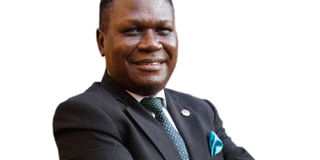Peter Nyombi and the messy border between law, politics

Norbert Mao
The outpouring of ridicule, denunciation and outright venom following the sad demise of former Attorney General Peter Nyombi brings to mind what Shakespeare wrote in Julius Caesar that “the evil that men do lives after them; the good is oft interred with their bones”.
Nyombi, who by all accounts died rather young, was said to be a bright child who managed to excel in Primary Leaving Examinations from rural Nakasongola and qualified to attend the prestigious King’s College Budo. From there he went to study law at Makerere University before obtaining a postgraduate Diploma from the Law Development Centre.
From 2006 to 2016, he served as MP for Buruuli County before being ousted in the general elections. From May 2011 to March 2015, he served his tumultuous term as Attorney General (AG).
Despite the many negative things said and written about his tenure as AG, those who eulogised him remembered that Nyombi served his constituents with compassion. For instance, he donated solar panels to maternity wards and health centres, helped renovate schools and provided boreholes for his constituency. He also provided free legal services to army veterans and to his local community.
Those who felt riled by Nyombi’s tenure as AG base their ire on some controversial legal opinions he gave. Among these are his advice that the NRM rebel MPs could be thrown out of Parliament upon expulsion by their party. He also advised government that former Chief Justice Benjamin Odoki could be reappointed to the same position even after leaving office upon reaching the mandatory age of retirement.
In addition, he made the polarising advice that the late Gen Aronda Nyakairima could be appointed minister of Internal Affairs while still serving in the army.
This latter opinion is still the subject of litigation in the courts. The opinions on the NRM rebel MPs and the reappointment of Justice Odoki were quashed by the Constitutional Court and the Supreme Court.
For these reasons the Uganda Law Society (ULS) convened an extraordinary meeting and passed a resolution suspending Nyombi’s membership of the society.
In addition, he was issued with a “certificate of incompetence” to declare the prevailing sentiment among the assembled members that the AG (albeit being head of the bar) was unworthy to be a member of the learned society. Nyombi was thus isolated and alienated by his peers.
Nyombi had no choice but to run to court to fight against the resolutions of the ULS. He successfully challenged ULS in court but that alone could not restore his standing in the eyes of the legal fraternity. Due to the unpopular positions he took in a politically charged environment, by the end of his second term Nyombi was staring into his open political grave. No wonder a little known opponent captured his seat in 2016!
Those who sought to be more charitable to Nyombi’s legacy as AG simply said a good lawyer has to put the best interests of his or her client first. In this case Nyombi as AG must have resolved that he was duty bound to defend to the hilt the interests of his appointing authority and the political party in power.
This brings us to the age old question of whether politics drives the law or vice versa. Law and politics are interconnected. Law is to a large extent the expression of the will of the dominant group in any polity. In that way the law structures, regulates and controls government in order to empower it to influence society.
The law determines the conduct of politics. Most political struggles revolve around who has the power to make, adjudicate and execute laws.
Maybe Nyombi was tactless but the toxic political environment in which he operated as AG put him between a rock and a hard place. Thankfully, Nyombi is now before an unbiased judge!




